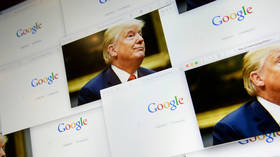The CNN search engine? Google favors stories from liberal news sites, study finds
Published time: 13 May, 2019 16:23

When it comes to political bias online, left-leaning Facebook and Twitter have been the most common punching bags, but a new study confirms that Google’s search algorithms are also skewed in favor of liberal viewpoints.
Researchers from Northwestern University performed an “algorithm audit” of the ‘Google Top Stories’ box, which is a major driver of traffic to news publishers and therefore prime online real estate. They examined results for nearly 200 searches relating to news events for one month in late 2017 and found “a left-leaning ideological skew.”
ALSO ON RT.COMGoogle flipped seats, shifted millions of votes to Dems in 2018 midterms, researcher tells RT
The researchers did allow some leeway for Google to defend itself, however, saying that while the left-leaning bias was detected, it is possible that the dominance of particular sources is a result of "successful strategic behavior" by those sources to achieve "algorithmic recognizability" — but whatever the reason, liberal sources still far eclipsed conservatives ones.
CNN, perhaps the outlet most-reviled by conservatives, was Google’s overall favorite source. Of the 6,302 articles appearing on Google's ‘top stories’ during the month in focus, more than 10 percent came from CNN. The New York Times and Washington Post were up next, garnering 6.5 and 5.6 percent of the results, respectively.
Fox News, the most mainstream right-wing outlet, was the source for only 3 percent of stories appearing in the top box. Then it was back to liberal outlets, with the BBC, USA Today, Los Angeles Times, The Guardian, Politico and ABC News filling out the rest of the top 10. Overall, 62.4 percent of the most common sources were left-leaning, while only 11.3 perfect were said to be right-leaning.
Ironically, despite the heavy promotion from Google in the online realm, CNN’s overall audience declined by a colossal 26 percent in April compared to a year earlier — and network boss Jeff Zucker admitted last November that CNN's audience just “goes away” any time the channel switches from its (overwhelmingly negative) coverage of President Donald Trump to other topics. So it seems CNN is stuck in a vicious cycle; criticized for focusing too much on negative Trump stories, yet not being able to stop for fear of losing more viewers.
Perhaps an even more damning indictment than Google’s detected liberal bias, however, is that nearly all (86 percent) of the stories promoted by the search giant came from just 20 sources across the entire internet, which doesn’t exactly display much of a commitment to diversity of information and opinion.
ALSO ON RT.COM'Poisonous connection' of big tech: Google staff confer over anti-Trump search tweak
Publishers selected for the top box receive "a significant boost in traffic" which demonstrates Google's ability to “pick winners and losers” based on where they decide to direct most of our attention. Such power and bias in favor of major sources could also be linked to the decline of local news, which is competing in an unfair online environment, the study suggested.
The detection of Google’s left-leaning preferences will hardly come as a shock to conservatives, who have been complaining in recent years that powerful online platforms like Facebook, Twitter and Google have all shown clear bias against conservative perspectives. The grumbling has not been without cause, either.
Most recently, Facebook slapped a number of popular conservative commentators with permanent lifetime bans — and Twitter has been caught out ‘shadowbanning’ Republicans and is accused of being quicker to suspend or ban conservative users over liberals for alleged rule-breaking.
Yet, while Facebook and Twitter have engaged in what many analysts and critics are calling direct political censorship, the story is more complicated when it comes to Google.
The researchers found that it’s not simply whether a source is left or right-leaning that determines whether it goes into the top stories box. Writing for the Columbia Journalism Review, one of the study authors acknowledged that there appears to be more news produced on the left overall, something which also affects the results. Even so, Google’s curation algorithms were still found to be “slightly magnifying” the already left-leaning skew in online news production.
Then there’s the bias toward timeliness; the fresher the story, the more likely it was to be promoted in the top box. The researchers called this Google’s “predilection towards recency” and said that huge news organizations like CNN which have the potential to quickly generate fresh content "may be better positioned" to garner more attention.
If Google really values diversity, the authors suggest it should acknowledge that high-quality journalism can have a longer shelf life and “consider relaxing the timeliness constraint to widen the scope of sources available to its curation algorithm.”
ALSO ON RT.COMFive examples that show internet censorship is as much a threat to the left as the right
The results put to bed the notion, promoted by many Democrats and liberals that Google algorithm bias is a myth. Rep. Jerry Nadler last year called the notion of liberal bias online a "delusion" and a "right-wing conspiracy theory” — although Nadler, who chairs the House Judiciary Committee is still a chief proponent of the disproven conspiracy theory that Trump colluded with Russia to win the 2016 election.
Google has always denied that it is politically biased or abusing its monopoly position, but it looks like the search engine has plenty of work to do on its curation algorithms before it can convince anyone of its fairness.



Geen opmerkingen:
Een reactie posten